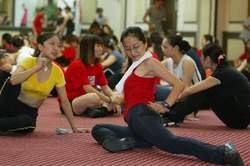 Many Chinese in large and medium-sized cities are spending more time and money in health and fitness clubs, to balance their work lives, seeking a scientific and customized recipe for their physical fitness. Many Chinese in large and medium-sized cities are spending more time and money in health and fitness clubs, to balance their work lives, seeking a scientific and customized recipe for their physical fitness.
For every woman, the name of the dance has an appealing ring, Shaping. And the Chain of International Shaping Association Clubs is famous for helping produce winners in International Beauty Pageants. Yekajienila is a Shaping coach, especially sent by the headquarters of the Shaping Association Club Chain in Russia, bringing Chinese women a new concept of beauty, health and fitness.
"Shaping can help shape every part of a woman's body. The Shaping system has a basic dancing course, including classic dance, Jazz dance, modern dance, gym dance and many others," said Yekajienila.
Aside from dancing, the Shaping Association Club also contains such systems as body evaluation, nutrition consultation, beauty salon, and image building. In 1997, Mr. Kang Tiancheng decided to bring this advanced system into China. So far, the number of his chain salons in China surpasses 150. Shaping attributes their rapid expansion in China to the accurate market positioning.
"We regard those who are well educated as our main customers. They are highly aware of the importance of health and fitness. Of course, they should also earn good salaries. A large portion of our customers are white collar workers," said Kang Tiancheng.
 With more knowledge about fitness being shown to the public, many Chinese people are beginning to realize that good health means more than good looks. They are also becoming aware that "exercising smart" can help them build body fitness.
With more knowledge about fitness being shown to the public, many Chinese people are beginning to realize that good health means more than good looks. They are also becoming aware that "exercising smart" can help them build body fitness.
Isabella, a Nirvana Member, said: "I just know that many Chinese girls, not only Chinese girls but too many girls want to be skinny, even the models, and I don't want to be skinny. I want to be a health girl. And I need some like muscles. I don't need fat, but if I want to lose fat I definitely got to grow muscles. And fitness is a good way to grow muscles and to lose your fat."
It's becoming a trend for these white-collar workers to step into health and fitness clubs.
White-collar workers are seeking relaxed surroundings to do exercises in with sophisticated equipment. Unlike other countries, China's health and fitness clubs are even becoming good places for people to meet friends and socialize. It's more like a community. Besides, there are also other reasons for which a consumer chooses a fitness club.
"My family is really very near from here, only take five minutes walk, so far I've worked here for three months, I did enjoy my stay here. I found myself here happily meet professional trainer star, who knows a lot about gyms in Bally. He not only tells me what to do and how to do. But also teach your principles and equipment. So it's very satisfying," said Tonie, a Bally member.
For any individual, the most important thing in working out is to do exercises more scientifically and healthily.
So most health and fitness clubs have especially employed personal trainers, or PTs, to provide club members with one-on-one fitness training. Through his personal communication with club members, Mr. Star, manager of P.T. department, CSI-Bally Total Fitness Club, has gained more understanding of the current fitness market.
 "There are three levels. One is that they are very rich, millionaires; they can pay for personal trainers every time. Second one, they are making good money, they can afford personal trainer. The third one is not that rich, but they still want to achieve their fitness goal, want to hire personal trainer, so they go to invest in personal trainer. And the second one is the biggest one,” said Mr. Star.
"There are three levels. One is that they are very rich, millionaires; they can pay for personal trainers every time. Second one, they are making good money, they can afford personal trainer. The third one is not that rich, but they still want to achieve their fitness goal, want to hire personal trainer, so they go to invest in personal trainer. And the second one is the biggest one,” said Mr. Star.
Currently, the average amount a Beijing dweller shells out for fitness every year exceeds $100 U.S. dollars. Assuming there are 10 million people in Beijing, the annual revenue of Beijing's fitness market would be over $10 billion U.S. dollars. But, what are the fitness clubs really earning here?
"There is only a few clubs in China, only a few clubs in Beijing. There is in Beijing right now maybe less than 10 independent health clubs, in Chicago alone, just Bally has 35 clubs, so that's just Bally, so you can imagine other health clubs in Chicago," Tomer S. Rothschild, director of Business Development (China), CSI-Bally Total Fitness Club.
High consumer demand, but low supply of operators, it's an equation bound to stimulate the development of an industry. After merging with China's Sport Industry this May, which is the only listed company of the nation's sports industry, the world's largest fitness club chain, Bally, is planning to open its second club in Beijing only six months after its first one began formal operations.
"There are Chinese people who really want to get fit, because they have more consumer spending power, more time, more leisure. Fitness in Chinese people's consciousness in their minds is becoming more important. At the same time we have big wave of Olympic 2008. So for all those reasons, China's really a market for Bally," said Rothschild.
If state-of-the-art gym equipment and spacious surroundings are initial attractions that pull in customers, the management philosophy would be the core reason for a club to keep its members and expand its market share.
"A club needs a complete management system, in order to permanently provide high quality services for members, to consistently enhance staff's level of knowledge, especially to ensure the continuous learning. A good management system will help keep everything in order," said Zhang Lin, GMCSI-Bally Total Fitness Club.
As an industry that is more about service than products, staff training has so far become a necessary part of fitness clubs' management strategies.
Although currently there is only a small number of independent fitness clubs in Beijing, every hotel here is equipped with a health center. As an expert in club staff training, Mr. Gordon regards it as a real business to provide training courses for hotel clubs. They are providing training courses for the staff of Pacific Century Center, where a private fitness club has opened in the building.
 "The club is also related with the service business, so we find, in order to do well, we have to make sure the staff have proper service training, the language training, the fitness training. So it's a broad training spectrum. We try to do it everything. In the end, I think the better club will have the staff well trained," said Gordon Chung, club director of Swissotel Beijing.
"The club is also related with the service business, so we find, in order to do well, we have to make sure the staff have proper service training, the language training, the fitness training. So it's a broad training spectrum. We try to do it everything. In the end, I think the better club will have the staff well trained," said Gordon Chung, club director of Swissotel Beijing.
As a dawning industry that just got off the starting blocks in China, fitness clubs also find many other challenges need to be overcome besides figuring out an effective management system. In order to accelerate the development of fitness clubs, both the government and market participants should establish a sound business environment for fair competition.
"Fair competition leads to prosperity. We are not afraid of fair competition but unfair competition. In my opinion, the government should spend more effort in protecting our Intellectual Property Rights," said Kang.
"Expenditures for both staff and technology improvement are quite sizeable in the health and fitness industry. In my opinion, when fitness clubs are still in the initial stage of development, the government should reduce our tax burdens in order to boost its development," said Li Bin, director of Club Nirvana Fitness & Spa.
 Despite the challenges, there is still more overseas investment being poured into China's fitness market. Some of China's local clubs also feel the impending competition. Being different from Bally, Haosha's business focus is not on the large-scale clubs. Haosha tries to expand the business to common people, and mainly pays attention to educating consumers about knowledge of sports. So far, Haosha has opened seven chain clubs in different business centers of Beijing.
Despite the challenges, there is still more overseas investment being poured into China's fitness market. Some of China's local clubs also feel the impending competition. Being different from Bally, Haosha's business focus is not on the large-scale clubs. Haosha tries to expand the business to common people, and mainly pays attention to educating consumers about knowledge of sports. So far, Haosha has opened seven chain clubs in different business centers of Beijing.
Zhang Yuan, GM of Haosha Fitness Club said:" China's traditional basic education on PE hasn't provided us with adequate knowledge on health care and protection, scientific exercises, and nutrition. So the mission of our social clubs is to make up for this. We should transmit relevant information to our consumers."
Nirvana is another local fitness club in the vein of overseas management models. Since Nirvana opened the first club in Beijing last year, its membership now nears 7,000, and it takes up a total area of more than 7,000 square meters. Being faced with the opponents at the door, Nirvana believes local clubs have advantages in understanding consumers' cultural background. But Nirvana also admits, reaching a win-win situation and cooperating internationally will be the trend for the fitness business.
"Overseas clubs have more experiences than we do. The fitness industries in their countries have developed for many years. They have mature management systems, including the method of chain club management. That's what we lack. So Nirvana is also actively seeking to cooperate with certain international clubs which are adaptable to our management model," said Li Bin.
Elegant and exotic dances, scientific methods of body evaluation, and personalized plans for working out and a nutritious diet. Both international and local fitness clubs in China are trying to make physical exercises a necessary part of the Chinese daily life. With a mature business environment for the operation of fitness clubs operation being set up, it's reasonable to believe that, in the future, Chinese people will lead much healthier and fitter lives.
Source: CCTV-9 China Business Guide
Editor: Yang Yang
|